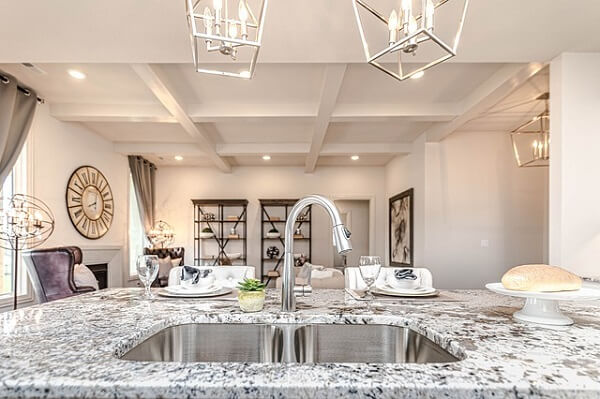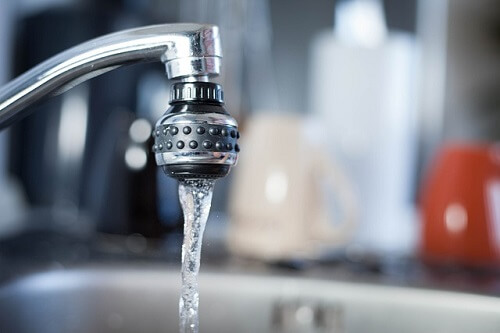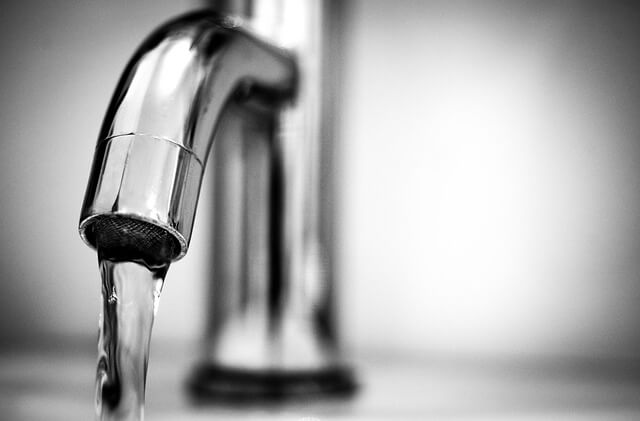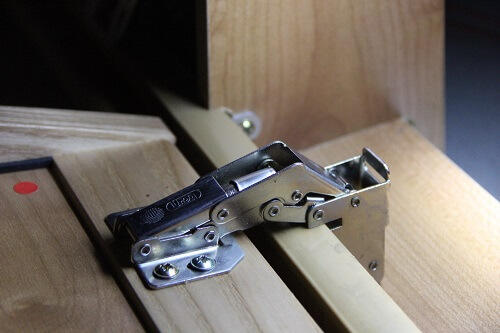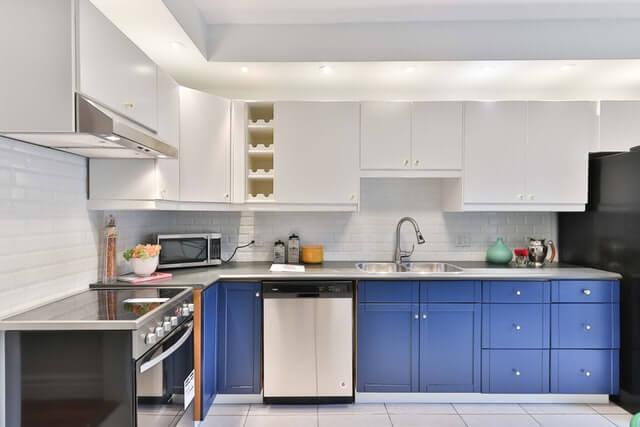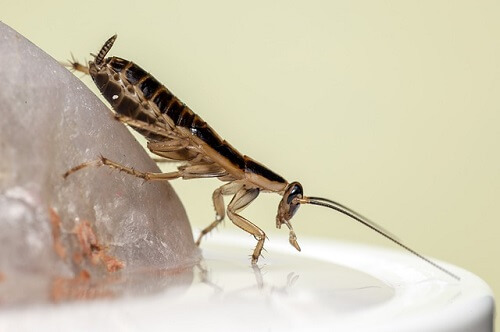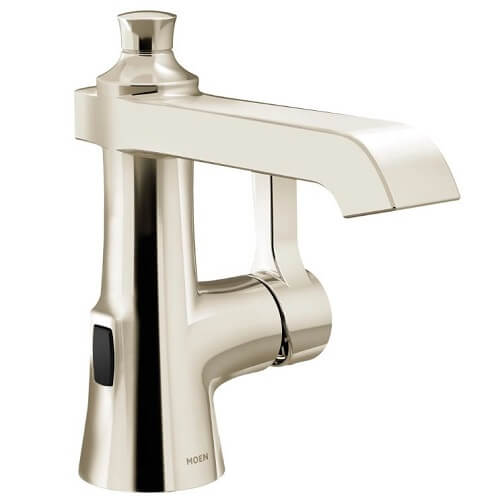The Effects Of Oven Cleaner On Kitchen Countertops And How To Properly Clean Kitchen Countertops
What does oven cleaner do to countertops?
This article is a full guide on how to properly clean your kitchen countertops in addition to the effects of oven cleaner on kitchen countertops.
The oven cleaners are a great way of getting rid of nasty stains and grease from your oven.
However, that does not mean that they have been designed to clean everything else in your kitchen. The chemicals used in oven cleaners are pretty strong, toxic, and corrosive.
This indicates that you should avoid using oven cleaners on the countertops in your kitchen.
Why do we say you should never try using an oven cleaner to clean your kitchen countertop? The main reason is that oven cleaners can cause some degree of harm to your kitchen countertops.
The oven cleaner can cause the kitchen countertop to fade, corrode, lose its color and even render the countertop useless altogether.
The adverse effects that the oven cleaner has on the kitchen countertop are more than what has just been stated right here, and we will be looking at them below in this article today.
We will also look at some alternative ways to clean the countertops in your kitchen. So let us look at the effects that oven cleaner has on your kitchen countertop when you use it to clean it.
First, let us look at the ingredients used in making these oven cleaners.
Harmful Ingredients Used In Making Oven Cleaners
The oven you use in your kitchen goes through some stress, and it has to deal with oil: food splatters, greasy baking trays, and the extremely high temperatures used for the baking processes.
From this, you can guess the oven cleaners are made with strong chemicals that will effectively clean the walls of the oven.
So as you can start guessing for yourself, it is not a good idea to use the oven cleaner in cleaning the countertops in your kitchen because they do not go through such stress, and these are typically made of delicate materials.
So what are the chemicals used in these oven cleaners that one should avoid? We have listed some of these chemicals below.
- Turpentine
- Foaming agents
- Crystallization agents
- Butane
- Monoethanolamine
- Monobutyle
- Diethylene
- Degreasers
- Sodium hydroxide
Apart from destroying the surface of your kitchen countertop and making its color fade away, the chemicals in the oven cleaners can also pose health risks when you get inside your food, causing food poisoning.
Even the leftover residue of the oven cleaner can react with your food while you are preparing it, leading to chemical reactions that can eat away at the countertops in your kitchen even faster.
An example of this is when you chop your vegetables while you are cooking.
What Is The Effect Of Oven Cleaner On Kitchen Countertops?
If you do not know the effects that oven cleaners can have on the different materials used in making kitchen countertops, we will take a look at them below.
The effect of the kitchen cleaner on your kitchen countertop typically depends on the materials used in making the countertop.
The ingredients in the oven cleaners will react differently with different materials in the kitchen countertops.
The surface of your kitchen countertop could come out destroyed, or it could come out untouched. It all depends on the material used in making your countertop and how it reacts with the chemicals in the oven cleaners.
We will now look at some different kitchen countertops and see the effects that oven cleaners have on them.
Can You Use Oven Cleaner On Countertops?
You don’t have to use oven cleaner on countertops because it contains chemicals that are known to be toxic and corrosive.
Using oven cleaners on countertops will cause harm to your countertop materials and might cause them to fade, corrode or lose their color.
Types Of Kitchen Countertops And How To Clean Them
Stone Countertop
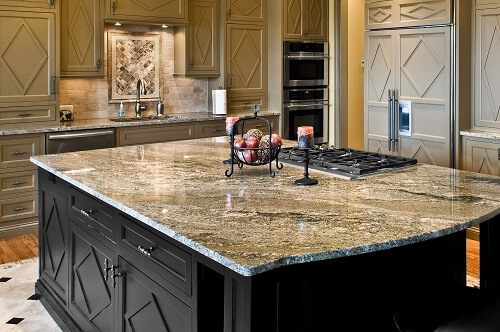
Stone countertops are prone to tarnishing due to the ingredients like sodium hydroxide, which can be found inside oven cleaners.
However, stone countertops can survive the effects of oven cleaners for a longer time than most other countertops.
This is also because most stone countertops are made of natural stone that you get directly from the earth, which means naturally made countertops.
Some examples of such countertops are granite and marble countertops. These stone countertops are naturally inert, so they are not easy to discolor.
The ones with the highest risk of damage from the oven cleaners are the quartz countertops. The quartz countertop style is an engineered countertop stone, or you can call it ‘man-made stone.’
The quartz countertop is put together through an artificial process by adding specific pigments to create color. And since the colors are synthetic, they are easily prone to the effects of the oven cleaners.
Natural stones, in this case, are much more challenging than artificial stones.
How To Properly Clean Stone Countertops
The stone countertops are cleaned slightly differently based on the type of stone used to make it. So you always have to make sure to read about the specific stone that your countertop is made of before you proceed to clean it.
It would help if you never tried to assume anything. Always look to make sure that you used the exact stone in making your kitchen countertop.
Nevertheless, you are generally safe using mild soap and warm water to clean stone countertops. Additionally, you can utilize products specifically designed for particular countertop surfaces, such as granite and marble.
You should make sure to seal your granite countertop annually with a granite sealer. The granite sealer soaks into your granite countertop to form a protective barrier that prevents the countertop from getting stained when something spills on it.
Tile Countertops
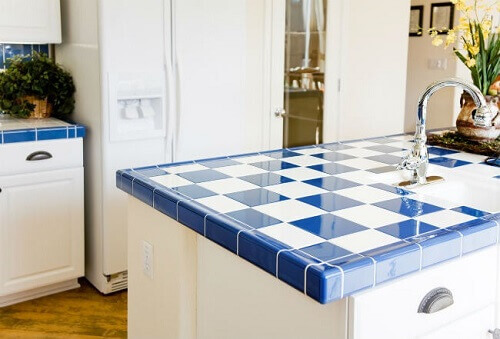
Tile countertops are not very common. However, some homeowners use oven cleaners to clean their tile countertops due to the frustration they get when they cannot clean the grout lines.
Although the oven cleaner may look like it is helping you get rid of the dirt in the grout line, it is doing more harm to the countertop, and that is something you can trust me on.
Spraying oven cleaner on the surface of the tile countertop will result in the chemicals eating away at the finish on the surface of the tile countertop.
It will then cause problems with the grout lines after a short while. Oven cleaners are certainly not the answer you are looking for when you clean your tile countertops.
How To Clean Tile Countertops
Instead of using oven cleaners to clean your tile countertops, you can make dish soap and warm water solutions inside a spray bottle.
You then clean the tiles vigorously until they look as good as you would want. As for the grout lines, you can use some specialized grout cleaning tools or even a toothbrush.
You can also get rid of the top layer of the grout with some specialized tools that you can purchase. You will end up with a fresh new layer of grout lines you can keep clean from that tie onwards.
Stainless Steel Countertops
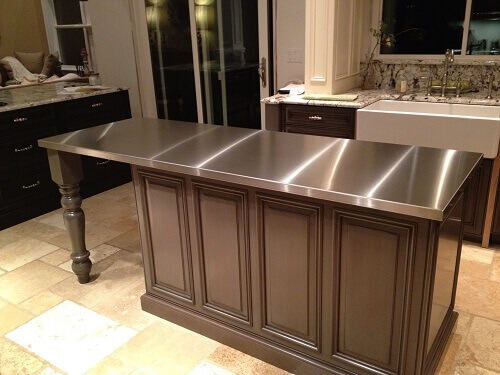
We can not talk about the effects of oven cleaners on kitchen countertops without talking about stainless steel countertops. These countertops have become quite common in modern kitchens and professional kitchens used by restaurants.
However, it would help if you did not clean the stainless steel with an oven cleaner because it can develop stains when the oven cleaner is used on it.
Although this may depend on the formulation, some steel countertops may survive the effects of oven cleaners.
However, taking such a risk is not worth it. The chemicals in the oven cleaner can also get inside the food that you will prepare on the countertop, and as I stated earlier in this article, that can lead to food poisoning, which can be harmful to anyone who eats the food.
How To Clean Stainless Steel Countertops
Instead of oven cleaners, you can regularly use warm water and dish soap to clean the stainless steel countertop.
It’s quite straightforward. Stainless steel stands out as one of the best kitchen countertop materials due to its resistance to quick staining.
Stainless steel is also resistant to easy penetration. For tougher stains that don’t respond to dish soap and warm water, you can use a mixture of hot water and vinegar on stainless steel countertops.
Formica Countertops
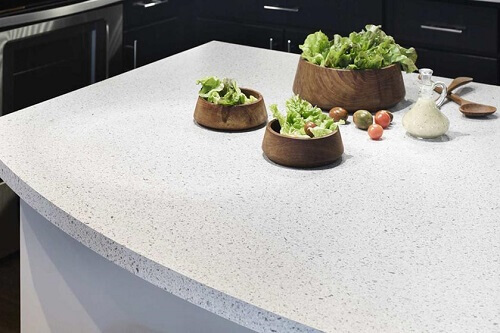
The Formica countertop, being a laminate-esque kitchen countertop surface, is highly durable but can still be susceptible to the detrimental effects of oven cleaners.
This should let you know that no countertop can come out of meeting an oven cleaning untouched. The Formica countertop could end up fading with some damage to its color when the oven cleaner is used on it.
Since this kind of countertop is expensive, you should take the risk of using an oven cleaner on it unless you want to blow away some money for nothing.
How To Clean Formica Countertop
You can clean the Formica countertop with an all-purpose kitchen cleaner.
You can make use of warm water and dish soap as well. Below are some other cleaners recommended for cleaning the Formica countertop.
- Liquid dish soap
- Original formula pine-sol
- Windex
- Formula 409
You can use these to clean the Formica countertop instead of an oven cleaner.
Wooden Countertop
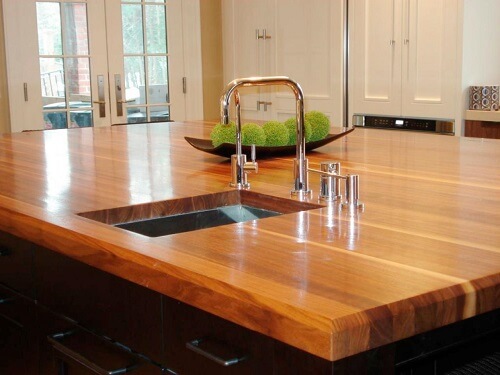
It would help if you never used an oven cleaner on a countertop made from wood, especially when it has a thin laminate veneer on the surface.
In the same way, you should not try cleaning a butcher’s block with an oven cleaner. The oven cleaner can cause a bubbling reaction that will turn the surface of the wood countertop into some strange gummy paste, running the countertop in the process.
Repairs can be quite expensive should you decide to carry them out.
How To Clean Wooden Countertops
You can clean your wooden countertop by spraying it with mild soap and warm water and then wiping it with a clean cloth.
Leave the countertop for air to dry and soak up the excess moisture with a clean paper towel.
Also, make sure never to submerge the wooden countertop in water. This can cause molds to grow, and the wood could even start rotting.
What If I Have Already Used Oven Cleaner On My Countertop
If you have already done something like this, you do not have to worry too much.
There is something you can do about it. You can clean your non-wood countertops with regular countertop cleaning products and then polish the countertops thoroughly.
Although this may not work all the time, you can give it a try as it will be able to bring back some of the colors that have faded.
For your wood countertops, you can oil it up after cleaning the surface very well with soapy water and a wooden countertop cleaner as well. After the surface has dried, you can then use the specialized wooden oil to get back the color of the wood and make it look good again.
Conclusion
I am sure that this article has given you some valuable insight into the effects of oven cleaner on kitchen countertops and how you can take good care of your kitchen countertops.
If you have been using an oven cleaner to clean them, you now know that you have been committing a huge mistake that could blow out anytime soon.
Always make sure to avoid using an oven cleaner to clean your countertops, and it is not advisable at all. You can also check out how much it costs to replace a kitchen cabinet.

